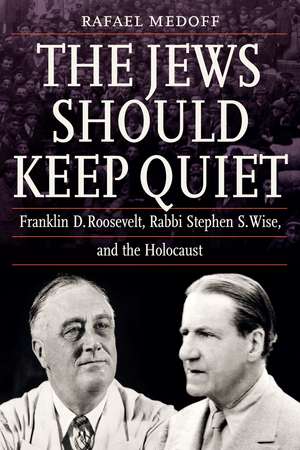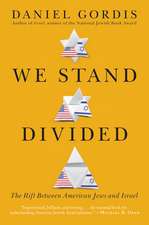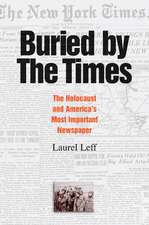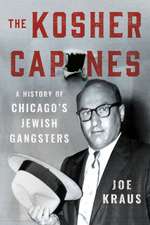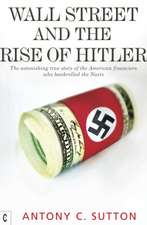The Jews Should Keep Quiet: Franklin D. Roosevelt, Rabbi Stephen S. Wise, and the Holocaust
Autor Rafael Medoffen Limba Engleză Hardback – sep 2019
What motivated FDR? Medoff explores the sensitive question of the president’s private sentiments toward Jews. Unmasking strong parallels between Roosevelt’s statements regarding Jews and Asians, he connects the administration’s policies of excluding Jewish refugees and interning Japanese Americans.
The Jews Should Keep Quietfurther reveals how FDR’s personal relationship with Rabbi Stephen S. Wise, American Jewry’s foremost leader in the 1930s and 1940s, swayed the U.S. response to the Holocaust. Documenting how Roosevelt and others pressured Wise to stifle American Jewish criticism of FDR’s policies, Medoff chronicles how and why the American Jewish community largely fell in line with Wise. Ultimately Medoff weighs the administration’s realistic options for rescue action, which, if taken, would have saved many lives.
| Toate formatele și edițiile | Preț | Express |
|---|---|---|
| Paperback (1) | 152.57 lei 22-36 zile | |
| The Jewish Publication Society – apr 2021 | 152.57 lei 22-36 zile | |
| Hardback (1) | 240.64 lei 22-36 zile | +54.13 lei 5-11 zile |
| The Jewish Publication Society – sep 2019 | 240.64 lei 22-36 zile | +54.13 lei 5-11 zile |
Preț: 240.64 lei
Nou
46.05€ • 48.20$ • 38.10£
Carte disponibilă
Livrare economică 17-31 martie
Livrare express 28 februarie-06 martie pentru 64.12 lei
Specificații
ISBN-10: 0827614705
Pagini: 408
Ilustrații: Index
Dimensiuni: 152 x 229 x 34 mm
Greutate: 0.79 kg
Editura: The Jewish Publication Society
Colecția The Jewish Publication Society
Locul publicării:United States
Notă biografică
Rafael Medoff is founding director of the David S. Wyman Institute for Holocaust Studies and coeditor of the institute’s online Encyclopedia of America’s Response to the Holocaust. He has taught history at Ohio State University, the State University of New York at Purchase, and elsewhere, and has written nineteen books about American Jewish history, the Holocaust, and related topics, including Too Little, and Almost Too Late: The War Refugee Board and America’s Response to the Holocaust.
Cuprins
Introduction: “If Only He Would Do Something for My People!”
1. “Nothing but Indifference”
2. In Search of Havens
3. Silence and Its Consequences
4. Suppressing the Dissidents
5. The Politics of Rescue
6. FDR, Wise, and Palestine
7. The Failure to Bomb Auschwitz
8. Antisemitism in the White House
Conclusion: A President’s Strategy and a Rabbi’s Anguish
Notes
Bibliography
Index
Recenzii
Descriere
Based on recently discovered documents, The Jews Should Keep Quiet reassesses the hows and whys behind the Franklin D. Roosevelt administration’s fateful policies during the Holocaust. Rafael Medoff delves into difficult truths: With FDR’s consent, the administration deliberately suppressed European immigration far below the limits set by U.S. law. His administration also refused to admit Jewish refugees to the U.S. Virgin Islands, dismissed proposals to use empty Liberty ships returning from Europe to carry refugees, and rejected pleas to drop bombs on the railways leading to Auschwitz, even while American planes were bombing targets only a few miles away—actions that would not have conflicted with the larger goal of winning the war.
What motivated FDR? Medoff explores the sensitive question of the president’s private sentiments toward Jews. Unmasking strong parallels between Roosevelt’s statements regarding Jews and Asians, he connects the administration’s policies of excluding Jewish refugees and interning Japanese Americans.
The Jews Should Keep Quiet further reveals how FDR’s personal relationship with Rabbi Stephen S. Wise, American Jewry’s foremost leader in the 1930s and 1940s, swayed the U.S. response to the Holocaust. Documenting how Roosevelt and others pressured Wise to stifle American Jewish criticism of FDR’s policies, Medoff chronicles how and why the American Jewish community largely fell in line with Wise. Ultimately Medoff weighs the administration’s realistic options for rescue action, which, if taken, would have saved many lives.
